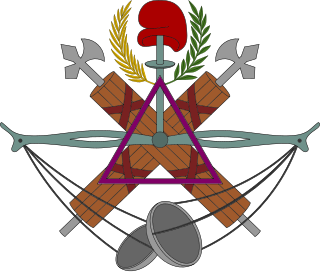
The Spanish Socialist Workers' Party is a social-democratic political party in Spain. The PSOE has been in government longer than any other political party in modern democratic Spain: from 1982 to 1996 under Felipe González, 2004 to 2011 under José Luis Rodríguez Zapatero, and since 2018 under Pedro Sánchez.

The Communist Party of Spain is a communist party that, since 1986, has been part of the United Left coalition, which is part of Sumar. Two of its politicians are Spanish government minister, the Minister of Labour and Social Economy and the Minister of Youth and Children.

The Party for Democracy, also known as For Democracy is a centre-left political party in Chile. It states to stand in the traditions of liberal progressivism. It was founded in December 1987 by Ricardo Lagos, who aimed at forming a legal social-democratic party, as the Socialist Party of Chile (PS) remained illegal at the time. The PPD continued to function after the defeat of Pinochet. Until 1997, double membership of PPD and the PS was allowed.

The Socialist Party of Chile is a centre-left political party founded in 1933. Its historic leader was President of Chile Salvador Allende, who was deposed in a coup d'état by General Augusto Pinochet in 1973. The military junta immediately banned socialist, Marxist and other leftist political parties. Members of the Socialist party and other leftists were subject to violent suppression, including torture and murder, under the Pinochet dictatorship, and many went into exile. Twenty-seven years after the 1973 coup, Ricardo Lagos Escobar won the Presidency as the Socialist Party candidate in the 1999–2000 Chilean presidential election. Socialist Michelle Bachelet won the 2005–06 Chilean presidential election. She was the first female president of Chile and was succeeded by Sebastián Piñera in 2010. In the 2013 Chilean general election, she was again elected president, leaving office in 2018.

New Space is a social democratic party in Uruguay.

The Socialist Party is a Centre-left political party in Argentina. Founded in 1896, it is one of the oldest still-active parties in Argentina, alongside the Radical Civic Union.

The Communist Party of Chile is a communist party in Chile. It was founded in 1912 as the Socialist Workers' Party and adopted its current name in 1922. The party established a youth wing, the Communist Youth of Chile, in 1932.

The Broad Front is a left-wing political coalition from Uruguay. It was the ruling party of Uruguay from 2005 to 2020 and has produced two presidents: José Mujica (2010–2015) and Tabaré Vázquez. Since 1999, it has been the largest party in Uruguay's General Assembly.

The Radical Republican Party, sometimes shortened to the Radical Party, was a Spanish Radical party in existence between 1908 and 1936. Beginning as a splinter from earlier Radical parties, it initially played a minor role in Spanish parliamentary life, before it came to prominence as one of the leading political forces of the Spanish Republic.

The Socialist Party of Majorca, officially PSM–Entesa after the incorporation of Entesa per Mallorca (ExM) in February 2013, is a political party in Majorca, Spain. The PSM defines itself as socialist, environmentalist, and Catalan nationalist, from a Majorcan point of view.

Peru Wins was a leftist electoral alliance in Peru formed for the 2011 general election. It was dominated by the Peruvian Nationalist Party and led by successful presidential candidate Ollanta Humala Tasso.

Proyecto Sur is a progressive political party established in 2007 in Argentina. It was founded and would be led by film maker Pino Solanas, who ran on the Proyecto Sur ticket for president in 2007 and for Mayor of Buenos Aires in 2011.

Encounter for Democracy and Equality, more commonly known as New Encounter is a Kirchnerist political party in Argentina founded in 2004 by then-mayor of Morón, Martín Sabbatella. The party now forms part of the Unión por la Patria, the coalition which supported former president Alberto Fernández and Sergio Massa's presidential campaign.
Generation for a National Encounter, sometimes known as the GEN Party or simply as GEN, is a centre-left political party in Argentina. It was founded in 2007 by Margarita Stolbizer as a split from the Radical Civic Union, in opposition to the UCR's endorsement of Roberto Lavagna's general election.













